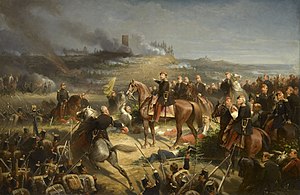Battle of Solférino
| Battle of Solferino | |||||||
|---|---|---|---|---|---|---|---|
| Part of the Second Italian War of Independence | |||||||
 The Battle of Solferino, by Adolphe Yvon |
|||||||
|
|||||||
| Belligerents | |||||||
|
|
|
||||||
| Commanders and leaders | |||||||
|
(Emperor of France) (King of Sardinia) |
Franz Joseph I (Emperor of Austria) |
||||||
| Strength | |||||||
| 138,000 French & Sardinian |
129,000 | ||||||
| Casualties and losses | |||||||
|
French: 1,622 killed Including 117 officers 8,530 wounded 1,518 MIA Sardinian: 691 killed Including 49 officers 3,572 wounded 1,258 MIA |
Austrian: 2,386 killed Including 94 officers 10,634 wounded 9,290 MIA |
||||||
The Battle of Solferino (referred to in Italy as the Battle of Solferino and San Martino) on 24 June 1859 resulted in the victory of the allied French Army under Napoleon III and Sardinian Army under Victor Emmanuel II (together known as the Franco-Sardinian Alliance) against the Austrian Army under Emperor Franz Joseph I. It was the last major battle in world history where all the armies were under the personal command of their monarchs. Perhaps 300,000 soldiers fought in the important battle, the largest since the Battle of Leipzig in 1813. There were about 130,000 Austrian troops and a combined total of 140,000 French and allied Piedmontese troops. After the battle, the Austrian Emperor refrained from further direct command of the army.
The battle led the Swiss Jean-Henri Dunant to write his book, A Memory of Solferino. Although he did not witness the battle (his statement is contained in an "unpublished page" included in the 1939 English edition published by the American Red Cross), he toured the field following the battle and was greatly moved by what he saw. Horrified by the suffering of wounded soldiers left on the battlefield, Dunant set about a process that led to the Geneva Conventions and the establishment of the International Red Cross.
The Battle of Solferino was a decisive engagement in the Second Italian War of Independence, a crucial step in the Italian Risorgimento. The war's geopolitical context was the nationalist struggle to unify Italy, which had long been divided among France, Austria, Spain and numerous independent Italian states. The battle took place near the villages of Solferino and San Martino, Italy, south of Lake Garda between Milan and Verona.
...
Wikipedia
